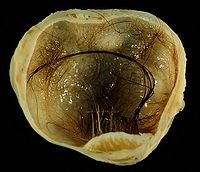
Photo from wikipedia
Pregnancy, N-Methyl-D-Aspartate Receptor Antibodies, andNeuropsychiatric Diseases Josep Dalmau, MD, PhD Jurek and colleagues used a recombinant monoclonal antibody (ab) derived from a patient with anti–N-methyl-D-aspartate receptor encephalitis (anti-NMDARe) to show… Click to show full abstract
Pregnancy, N-Methyl-D-Aspartate Receptor Antibodies, andNeuropsychiatric Diseases Josep Dalmau, MD, PhD Jurek and colleagues used a recombinant monoclonal antibody (ab) derived from a patient with anti–N-methyl-D-aspartate receptor encephalitis (anti-NMDARe) to show that systemic administration to pregnant mice resulted in 27% postnatal mortality, altered levels of NMDARs, impaired neurodevelopmental reflexes, and had long-lasting neuropathological effects. Searching for a human application for these findings, the authors determined the presence of NMDAR abs in serum of asymptomatic mothers of patients with neuropsychiatric disorders (MPs) and mothers of healthy persons (MCs) serving as controls. None of the mothers had a history of anti-NMDARe, and their serum was tested 4 to 20 years after pregnancy. The authors found a spectrum of NMDAR-abs slightly higher in MPs than in MCs, concluding that low-level NMDAR-abs of asymptomatic MPs can be transferred to the fetus, causing neuropsychiatric morbidity. Considering the experience with humans, these conclusions are premature and can be distressing for patients with a history of anti-NMDARe who remain ab-positive for a long time after
Journal Title: Annals of Neurology
Year Published: 2019
Link to full text (if available)
Share on Social Media: Sign Up to like & get
recommendations!